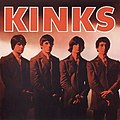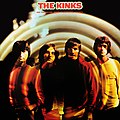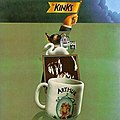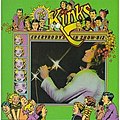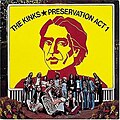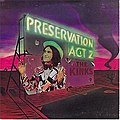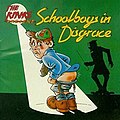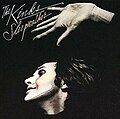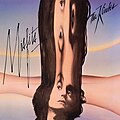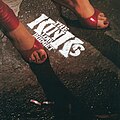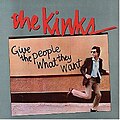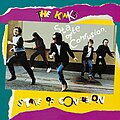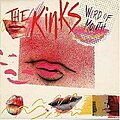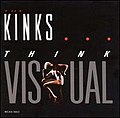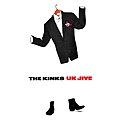The Kinks
Template:Infobox musical artist 2
The Kinks were an influential and prolific English rock group, formed in the mid-1960s by Ray Davies and his brother Dave Davies. They first gained prominence in 1964 with their hit single "You Really Got Me" and continued to record and perform for over thirty years. The band's name came from their "kinky" dress sense.[1] The group's original lineup consisted of lead singer/guitarist Ray Davies, lead guitarist Dave Davies, drummer Mick Avory and bassist Peter Quaife. In the United States, they are included in the Big Four of the British Invasion bands: The Beatles, The Rolling Stones, The Kinks and The Who.
While they were never as commercially successful as their mid-1960's peers, The Beatles, The Rolling Stones, or The Who, the band is frequently cited as one of the most important and influential acts of the 1960s.[2] Their early hard-driving singles set a standard in the mid-1960s for rock and roll that reverberated for decades. Albums such as Face to Face,[3] Something Else, Arthur, Village Green and Muswell Hillbillies are highly regarded, by fans and peers alike, and are considered amongst the most influential recordings of that era.[1] Since then the band has experienced a popular fan revivals in the late 70s and early 80s followed by a painful commercial collapse in the late eighties continuing until their disbandment in the early 90s.
After their last tour in the middle 90s, for their latest again-commercially unsuccessful album, the band has been largely inactive. The relationship between the Davies brothers seems to have deteriorated completely around then. Both of them had embarked on a critically acclaimed solo careers with Ray promoting his highly acclaimed first solo album Other People's Lives. Rumours of a Kinks reunion are persistent but still vague. Since the exit of longtime drummer Mick Avory (serving in the band's first two decades) in 1984, the latter has been a manager of the band's Konk Studios, where most of the band's material since 1973 has been recorded. As the band are still disbanded, in recent years Avory has been promoting Kinks material with former Kinks members of the 70s John Dalton and John Gosling, including Dave Clarke on guitar and vocals in the formation "Kast off Kinks". He also have joined the veteran supergroup called "The Class of 64" (refering to the year the British Invasion took America by storm) with members from The Tremeloes and The Hollies, which are also promoting Kinks material among other bands' material.
Whatever the bands fortunes, their influence on emerging artists has been a constant. During the Punk rock and New Wave era The Jam and The Pretenders both covered Kinks songs[1] and Britpop acts such as Blur, Oasis and Supergrass have cited them as a major influence.[2] As self-professed Kinks fan Pete Townshend said for 'The History of Rock 'n' Roll': "The Kinks were much more quintessentially English. I always think that Ray Davies should one day be Poet Laureate. He invented a new kind of poetry and a new kind of language for Pop writing that influenced me from the very, very, very beginning."
History
(1963-1966) Formation and first years
The Davies brothers were born in Muswell Hill, North London. Ray Davies (b. Raymond Douglas Davies, 21 June 1944; vocals/guitar/piano) studied to be a theatre director at Hornsey College of Art and gained experience in music as a guitarist with the Soho-based Dave Hunt Band in 1963.[1] Ray and his brother Dave (b. 3 February 1947) had been playing skiffle and Rock & Roll together. Ray's Schoolmate Pete Quaife (b. 31 December 1943, Tavistock, Devon, England; bass) joined them and they formed a band.[2]
By the summer of 1963, the band had decided to call themselves "The Ravens" and had recruited drummer Mickey Willet. Eventually a demo tape landed in the hands of American record producer Shel Talmy, who helped them land a contract with Pye Records in 1964 and they changed their name to The Kinks.[2] Before signing to the label, drummer Willet left the band. The Kinks invited drummer Mick Avory (b. Michael Charles Avory, February 15 1944) to join the band after seeing his advertisement in the magazine Melody Maker. Avory's previous experience included one gig with the Rolling Stones,[4] but his background was in jazz drumming.[citation needed]
The first single from The Kinks, "Long Tall Sally," was a cover of Little Richard. As The Beatles also covered it with enormous success, the Kinks' version was overlooked and failed to chart. Nevertheless, the band received a lot of publicity through the efforts of their managers Robert Wace, Grenville Collins, and ex-1950s showbiz star Larry Page. Their second single "You Still Want Me" also failed.[1] Pye warned the band that they had only one more chance. Another unsuccessful single would result in their being dropped from the label.[citation needed]
The third single "You Really Got Me" entered the charts at No.1 in the UK and made the top 10 in the US, boosted by a performance on the UK television show Ready Steady Go!. With a loud, distorted guitar riff, achieved by Daves home made "little green" amplifiers, "You Really Got Me" provided a blueprint for hard rock. The group's fourth single, "All Day and All of the Night", another hard rock tune, was released late in 1964. It rose to No. 2 in the UK, and hit No. 7 in the US.[1] In 1965, the Kinks recorded "Set Me Free", and "Tired of Waiting for you", featuring a repeated bass guitar riff on both songs.
The group continued to record, with three albums and several EPs in the next 2 years. They also performed and toured relentlessly, which caused tension within the band.[2] Some legendary onstage fights erupted during this time as well. In the most notorious incident, at The Capitol Theatre, Cardiff, Wales in 1965, the normally placid drummer Avory hit Dave Davies with his hi-hat pedal and assaulted him on stage.[1] At the conclusion of their summer 1965 American tour the American Federation of Musicians had the Kinks banned from re-entering the United States by United States Government for unspecified reasons[1][2] although it has been suggested that the AFM feared that British bands were gaining too much share of the music market and picked on the Kinks[5] and conflict with their tour promoter due to poorly attended shows and a fight with a union member while recording Dick Clarks television show may also have been the cause.[6] Whatever the reason the band were prohibited from returning to the US for four years, meaning they were cut off from all the social, cultural and commercial opportunities available to their British Invasion contemporaries.[1][2]
The band's stylistic changes were first evident in late 1965, with the appearance of singles like "A Well Respected Man," "Dedicated Follower of Fashion," and the third album The Kink Kontroversy. These demonstrated the progression in Davies's songwriting from hard driving rock numbers towards social commentary, observation, and idiosyncratic character study, all with an increasingly English flavour. The satiric single "Sunny Afternoon" was the biggest hit of the summer of 1966 in the UK, topping the charts.[1][2]
Prior to its release, Ray Davies suffered both a nervous and physical breakdown from the pressures of touring, writing, and ongoing legal squabbles. He spent several months recuperating, during which he wrote several new songs and ponder about the band's direction.[6] Quaife also left the band for much of 1966 after an automobile accident. After he recovered, he decided to step back from the band. Mick Avory's friend John Dalton replaced Quaife, but Quaife decided to return at the end of the year. This caused little tension as Avory was more used to Dalton's style of playing.[7]
"Sunny Afternoon" was a dry run for the band's Face to Face. One of the earliest concept albums, Face to Face displayed Davies' growing skill at crafting gentle yet cutting narrative songs about everyday life and people. The great social comment single "Dead End Street" was released at the time of Face to Face, and became another big UK hit.
(1967-1972) "Golden age"
In May 1967, they returned with "Waterloo Sunset" (which reached #2 on the UK charts), a simple but emotional single with the melancholic singer observing two lovers meeting and crossing over Hungerford Bridge in London. The songs on the 1967 album Something Else By The Kinks continued the musical progressions of Face to Face, but without the thematic consistency of that album. Dave Davies scored major chart success with "Death of a Clown," co-written with Ray and recorded by The Kinks, but released as a Davies solo single. Later, even the Rolling Stones would remark that these two albums were very influential to their own albums of the late 1960s.
Although the band grew tremendously in a mere couple of years, their performance in the charts was lackluster, as the tastes of the pop world began to change. After the weak reception of Something Else, the Kinks rushed out a new single, "Autumn Almanac," which became a hit in the UK. But "Wonderboy," released in the spring of 1968, stalled at No. 36 and was the band's first single not to make the Top Ten since "You Really Got Me".
Throughout 1968, Davies continued to pursue his deeply personal songwriting style, while at the same time rebelling against the heavy demands placed on him to keep producing commercial hit singles. The Kinks released the single "Days," which made No. 12, in the summer of 1968. But their album The Kinks Are the Village Green Preservation Society, released in the autumn of 1968, failed to sell well. A collection of thematically-related vignettes, assembled from songs written and recorded over the previous two years, the album lacked a viable single (despite that the single Starstruck made it to the Top Twenty on the UK charts) and seemed willfully out of touch with the social and psychedelic music popular at the time. "Village Green" is an intentional refutation of The Beatles' Sgt. Pepper concept piece. Where The Beatles' song cycle is full of countercultural themes and sees John, Paul, George and Ringo taking on an artificial persona as a psychedelic marching band, "Village Green" is sung from the point of view of middle-class Britons, bewildered by the enormous social shifts of the late 60s. "God save little shops/China cups and virginity" goes the title song, while songs like "Big Sky" addressed the people's helplessness, or perhaps reluctance, to stop the shift in society. The album was commercially unsuccessful but well-received by the new underground rock press, particularly in the US, where The Kinks' status as a cult band began to grow. Village Green is now widely considered one of the best rock records of the era, and even yielded an unlikely "hit" of sorts when the album track "Picture Book" was used as the theme music for a popular Hewlett-Packard television commercial in 2004.
Original bassist Peter Quaife resigned in March 1969 and was swiftly replaced by John Dalton. The American ban upon the band was finally removed that same year. When The Kinks returned to the US their shows were held in small venues, such as the Fillmore East. The band had to adapt to a concert scene that had changed radically in their absence. It took several years of extensive touring in the US between 1969 and 1972 before the band developed a disciplined stage act that would generate positive reviews and draw crowds to medium and large size concert venues.
Before their return to the US, the Kinks crafted another album, Arthur (Or the Decline and Fall of the British Empire). As with the previous two albums, Arthur was soaked with British lyrical and musical hooks, having been conceived as the score for a proposed television drama, which never materialised. It was a modest commercial success, and was particularly well received by music critics in America, where it was favorably compared to the rock opera Tommy by The Who. Arthur is best-known for the song Shangri-La.
While the band were recording the follow-up to Arthur, they added keyboardist John Gosling to their line-up. Gosling's debut with The Kinks was on "Lola", a humorous account of a confused romantic encounter with a transvestite that became a hit in both the UK and the US. The song originally contained a reference to "Coca Cola", but the BBC refused to play it as this was considered a violation of their advertising policy. The single had to be hastily re-recorded with the line changed to "cherry cola". The album Lola versus Powerman and the Moneygoround, Part One was their most successful since the mid-1960s. The album also featured the group's final UK Top 10 hit, "Apeman."
In 1971, the band released Percy, a soundtrack album to a film of the same name about the transplantation of a penis. It is generally regarded as a lesser Kinks effort. The band's US label, Reprise, declined to release it in America, precipitating a major dispute that contributed to the band's departure from that label.
In 1971, the band's contracts with Pye and Reprise expired. Before the end of the year, The Kinks signed a five-album deal with RCA Records and received a million dollar advance. This helped fund the construction of their own recording studio, Konk Studio. Their debut for RCA was Muswell Hillbillies, soaked with country influence and often hailed as their last best record, which however failed to be a commercial success. A few months after the release of Muswell Hillbillies, Reprise released a double-album compilation called The Kink Kronikles, which outsold Muswell Hillbillies.
Everybody's in Show-Biz, a double album consisting half studio tracks and half live tracks, documenting a two-night Carnegie Hall stand, was released in 1972. The record most prominently featured the ballad "Celluloid Heroes" and the catchy "Supersonic Rocket Ship", their last UK Top 20 hit for over a decade. "Celluloid Heroes" was a bittersweet rumination on dead Hollywood stars in which Ray Davies admits that he wishes his life were like a movie, "Because celluloid heroes never feel any pain/And celluloid heroes never really die." The album was a commercial failure in the UK, but more successful in the US. The record was a transitional piece between their earlier material and the theatrical incarnation they immersed themselves in the next 4 years.
(1973-1976) Theatrical incarnation
In 1973, Ray Davies dived headlong into the theatrical style, with a rock opera called Preservation, a sprawling chronicle of social revolution that is a more ambitious if less successful outgrowth of the earlier Village Green Preservation Society. In conjunction with the Preservation project, Davies expanded the Kinks' lineup to include a horn section and female backup singers, essentially reforming the group as a theatrical troupe. Preservation was the first project recorded at Konk Studio. From this point forward, virtually every Kinks studio recording would be produced by Ray Davies at Konk.
Ray suffered serious marital problems during this period, which adversely affected the band. Coupled with the band's abuse of drugs and alcohol and their lack of enthusiasm for the theatrical style, the band's output remained uneven and their already wobbling popularity eroded. Notable songs from this period include "Daylight", "Where Are They Now?", and "Sweet Lady Genevieve" and the more rock-oriented "Money Talks" and "He's Evil".
Preservation: Act 1, closer in spirit to vaudeville than to rock opera, was released in late 1973, and it received generally poor reviews, though its live performances fared better with the critics. Preservation: Act 2 appeared in the summer of 1974 and received similar reception. Davies began another musical, Starmaker, for the BBC; the project eventually metamorphosed into the thematically complex if uneven concept album The Kinks present A Soap Opera, released in the spring of 1975, in which Ray Davies fantasized about what would happen if a rock star traded places with a "normal Norman" and took a 9-to-5 job.
In 1976, the Kinks recorded their final theatrical work, Schoolboys in Disgrace, a backstory biography of Preservation's capitalist overlord Mr. Flash. Compared with the previous three albums, the songs on Schoolboys were more independent from the album's concept and featured a harder rock sound. Some of the songs were performed at the Dutch Pinkpop festival, where a blind-drunk Ray Davies raced through an embarrassing golden oldies set, to the amusement of the equally inebriated crowd.
In 1976, the Kinks signed with Arista Records. With the encouragement of Arista's management, they recast themselves as a commercial rock group again, stripping down to a five-person core group and jettisoning the extra personnel from the theatrical phase. Essentially, the Kinks abandoned the experimentation of the previous decade and resumed from where they left 5 years ago.
Rock was also in a back-to-basics trend at this time, spearheaded by the Punk movement and the emergence of late 1970s "supergroups". One of the biggest of these, Van Halen, achieved their breakthrough hit with a powerful remake of "You Really Got Me", which in turn greatly boosted The Kinks' resurgence. With the Davies' renewed creativity, the band bounced back on the record charts and began their most commercially successful period.
(1977-1984) Commercial success
John Dalton left the band before finishing the track "Mr. Big Man" for their debut Arista album. Andy Pyle was brought in to complete the track and to play on the following tour. Sleepwalker featured the touching ballad "Brother" and the reflective rocker "Juke Box Music" among others. The single "Father Christmas" followed in late 1977 and became a seasonal fixture on US rock radio. The b-side "Prince of Punks" was Ray Davies' satirical comment on his former protege Tom Robinson of "2-4-6-8 Motorway" fame.
Andy Pyle and keyboardist John Gosling left the group to work together on a different project. Dalton returned to complete the tour, and ex-The Pretty Things keyboardist Gordon Edwards joined the band. The Kinks' second Arista album Misfits - their only album with Andy Pyle - was released in 1978 and included the semi-hit "A Rock 'n' Roll Fantasy," a stirring, mid-life-crisis-themed tribute to The Kinks' dedicated fanbase, plus the title track, a commentary about the lack of commercial success by the band. Misfits is often cited as one of the band's best late period albums.
There were further changes before The Kinks coalesced around a more stable line-up. Dalton left the band permanently after the end of their UK tour, with Edwards soon to follow. Ex-Argent bassist Jim Rodford joined the band, which recorded Low Budget with Ray Davies handling keyboard duties. Former Life-keyboardist Ian Gibbons was drafted for the following tour and soon become a permanent member. Despite the personnel changes, the group's recording and concert success continued to grow. Moreover, Rodford and Gibbons, who were talented musicians made significant contributions to the band's sound and commercial success.
During this time in the late 1970s, punk bands like The Jam ("David Watts") and The Pretenders ("Stop Your Sobbing") and heavy metal acts like Van Halen ("You Really Got Me") recorded successful covers of Kinks songs, boosting each band's fame. At the same time, these cover versions helped fuel the commercial success of each new Kinks release. The hard and punk rock sounds of Low Budget (1979) helped make it the group's most successful album in America, peaking at number 11. Davies' crafted intelligent, polished, and commercially appealing songs like "Pressure", "A Little Bit of Abuse", "Catch Me Now I'm Falling", and the minor, disco-flavoured hit "(Wish I Could Fly Like) Superman". 1979 also saw the Kinks headline at Madison Square Gardens for the first time.
A live album (their third) and video, both called "One for the Road", followed in 1980, bringing the group's concert drawing power to a peak between 1980 and 1983. Dave Davies also took advantage of the group's improved commercial standing to fulfill his decade-long solo ambitions and released albums on his own, including the eponymous "Dave Davies" in 1980 (also known by its catalogue number "PL13603" owing to its striking cover art, which depicted Dave Davies as a leather-jacketed piece of price scanning barcode) and 1981's less successful "Glamour".
The next Kinks album, Give the People What They Want, was released in late 1981 and reached number 15 in the US. The record attained gold status, and featured the optimistic pub-rocker "Better Things" (a rare UK hit single), as well as "Destroyer", tracks reminiscent in sound to the band's 60s heyday. The Kinks spent the better part of 1982 touring. In spring 1983, the nostalgia-themed and swing-flavoured "Come Dancing" became their biggest American hit (at number 6)since "Tired of Waiting for You". Come Dancing also became the group's first top 20 hit in the UK since 1972, peaking at number 12 in the charts. The anthemic album State of Confusion followed and was another commercial success, going to number 12 in the US, but once again failing to chart in the UK, as had all previous albums since 1967. Prominent tracks were the ballads "Don't Forget to Dance (a US top 30 hit, and minor UK chart entry)," "Long Distance", the title track and the gentle sing-along "Heart of Gold". Especially notable for fans of The Kinks' 1960s achievements was "Young Conservatives," an attack on the politics of America's Ronald Reagan and on British Thatcherism that is essentially an updated sequel to "David Watts", replete with a few of the old trademark "fa-fa-fa-fa"'s. During this time, Ray Davies became romantically involved with Pretenders leader Chrissie Hynde, resulting in the birth of a daughter, Natalie Ray, in 1983.
The Kinks' second wave of popularity effectively peaked with State of Confusion in 1983, but both internal and external factors would soon begin to undermine them. A music video-fueled influx of new, fresh talent and styles into popular music at this time effectively muted the early 80s resurgence of many of the classic acts (including fellow UK bands such as David Bowie, The Who, and The Rolling Stones). Bands influenced by The Kinks like U2, the Smiths, The Jam and Duran Duran were topping charts. The concert market for Kinks shows in the US had largely been played out by a decade of almost non-stop touring. As these outside pressures mounted, the internal strife in the group reached a critical point.
During the second half of 1983, Ray Davies started working on an ambitious solo film project, Return to Waterloo, about a London commuter who daydreams he's a serial murderer. (The film gave actor Tim Roth a significant early role.) Davies' commitment to writing, directing and scoring the new work caused tension in his relationship with his brother. Another problem was the stormy end of the volatile romance between Ray Davies and Chrissie Hynde. The old feud between Dave Davies and The Kinks' quiet drummer Mick Avory also reignited. Soon Dave Davies wanted Avory replaced by the former drummer from Argent and (Jim Rodford also performed in that band) Robert Henrit, who had drummed on Dave's solo albums. It is also believed that Rodford also was instrumental in bringing his former bandmate in the fold.
These conflicts took a heavy toll when Avory left the group. His relationship with Dave Davies had reached a breaking point. Dave Davies refused to work with Avory. Ray Davies said that Mick was his best friend of the band and he unwillingly had to choose sides as said later in 1989 interview: "The saddest day for me was when Mick left.... Mick had an important sound. Mick wasn't a great drummer, but he was a jazz drummer - same school, same era as Charlie Watts." Bob Henrit was brought in to take Avory's place. At Ray Davies' invitation Avory agreed to manage the Konk studio, and he served as a producer and occasional contributor on later Kinks albums.
Between the completion of Return to Waterloo and Avory's departure, the band had already begun work on Word of Mouth, released in late 1984 with Avory still part of the line-up on three tracks. The album was similar to the last few Kinks records, but many of the best songs had already been featured in solo versions on Ray Davies' companion album for Return to Waterloo, and others lacked the heart, cleverness, and quality of the previous albums. The Kinks' rhythm section, no longer supported by Avory, was especially troubled, with a third of the tracks performed by Avory, others by Henrit and still others by a drum machine which the band employed before the arrival of Henrit. Meanwhile, reports circulated that the Davies brothers were performing their album parts separately, unable to face each other in the studio. Despite everything, some standout material made the cut on Word of Mouth, including Ray's ballad "Missing Persons", Dave's death-of-empire themed "Living on a Thin Line", and The Kinks' last Billboard Hot 100 entry, "Do it Again" (#41). Intense squabbles over song selections and singles released further strained the Davies brothers' working relationship. Following this album, the Kinks seemed to lose their commercial edge, and they have never yet again made it to the Top 40.
(1985-1996) Fall in popularity
Word of Mouth was the last Kinks album for Arista Records. In early 1986, the group signed with MCA Records in the United States and London Records in the UK. Their first album for the new label, Think Visual, (1986) was a moderate success, and holds interest as a result of songs like the ballad "Lost and Found", "Working at the Factory," which equated making records with blue-collar life on an assembly line, and the title track, an attack on the very MTV video culture the band seemed to be enjoying so much during the earlier part of the decade. During the Think Visual sessions Mick Avory patched up his friendship with Dave Davies and played on Dave's composition "Rock 'N' Roll Cities". Avory was asked to rejoin The Kinks but declined, desiring a break from the non-stop schedule of recording, touring, and performing. The Kinks followed Think Visual in 1987 with another live album, titled The Road, which was a mediocre commercial and critical performer. In 1989, the Kinks released UK Jive - an out and out commercial failure. MCA Records ultimately dropped them, leaving The Kinks scrambling to find a label deal for the first time in over a quarter of a century. Longtime keyboardist Ian Gibbons left the group during this period, disappointed with the band's sudden lack of success.
In 1990, their first year of eligibility, The Kinks were inducted into the Rock & Roll Hall of Fame alongside The Who, Simon and Garfunkel, The Four Seasons, The Four Tops, Hank Ballard and The Platters. Mick Avory and Pete Quaife were on hand for the award. When receiving the award Ray Davies looked out at the audience and said, "Seeing everybody makes me realize rock 'n' roll has become respectable. What a bummer." The prestigious induction, however, did not bring back The Kinks' stagnated career. In 1991, a compilation from the MCA Records period, Lost & Found (1986-1989) was released to fulfil contractual obligations and their MCA period officially ended. The band signed with Columbia Records and released the 5 song EP Did Ya, which, despite a new studio re-recording of the band's 1968 British hit "Days," failed to chart.
The Kinks' first album for Columbia, Phobia (1993), was released and recorded by the band as a four-piece. Gibbons rejoined for the tours and again became part of the band. The record was critically well received, but yet again a commercial failure only managing one week in the US Billboard chart at #166. As usual, no impression was made on the group's home country chart in the UK. The album, which contained a disproportionate contribution from Dave Davies and an at times overzealous heavy rock sound, suffered from lack of promotion (the public still perceiving the Kinks as a 60s act). But Phobia had moments of interest, including the call and response duet "Hatred," in which the Davies brothers sent up their fractious reputation as brawling brethren. One single, "Only a Dream" narrowly failed to reach the UK chart, climbing to #79, but sadly the release of one of The Kinks finest singles was botched. "Scattered", the album's final track's release as a single was announced, TV and radio promotion followed, but it could not be found in the shops. Several months later a small number appeared on the collector market. Yet another opportunity wasted for a single which was receiving airplay, yet the record company let the band down.
Following this failure, the group was dropped by Columbia in 1994. In 1994 the band released the first version of the album To the Bone on their own Konk label in the UK, a live album recorded partly on the highly successful UK tours of 1993 and 1994, and in the Konk studio before a small invited audience. Two years later the band released a new improved double CD live set in the USA, still called To The Bone, which now consisted of two new studio tracks ("Animal" and "To the bone") paired with effective new treatments of many old Kinks hits, on independent labels in the UK and the US. It failed to chart in either. After the Hall of Fame induction, the Kinks decided to make some moves in the "unplugged" direction and softened their live performances, giving sensitive treatment to little-played songs from their early career such as the aforementioned "Days" and "I'm Not Like Everybody Else" from 1966.
In 1995, Dave Davies co-composed the soundtrack to horror filmmaker John Carpenter's remake of the 1960 alien invasion classic Village of the Damned.
The band's name and profile rose considerably in the mid 1990s, mainly due to the British rock boom called "Britpop" by the UK press. Several of the most prominent bands of the decade, including Blur, Pulp, Suede and Oasis, acknowledged The Kinks as a major influence on their careers and proclaimed themselves as among The Kinks' most admiring students. Blur frontman Damon Albarn and Oasis' chief songwriter Noel Gallagher especially stressed that the Kinks were one of the bands that made the biggest impact on their songwriting as well as their development as artists and musicians. Sadly, all these accolades made little difference to the commercial viability of the group, rumours of a final break-up began to unfold in reality.
Ray Davies took to his familiar role as a touchstone for yet another generation of British rockers, and acted as Britpop's "godfather" in a manner reminiscent of his relationship to The Jam and The Pretenders in the late-1970s. His intricate autobiographical novel X-Ray was published in early 1995, while the Britpop hysteria was at its peak in the UK. Not to be outdone, brother Dave Davies responded with his memoir Kink, published in the spring of 1996.
(1997-present) Disintegration and solo work
The Kinks performed together for the last time in mid-1996. The brothers' relationship seem to have broken completely around this time as Ray reportedly didn't attend his brother's 50th birthday. Talk of a Kinks reunion has circulated (including an aborted reunion of the original band members in 1999), but both Ray and Dave Davies have shown little interest in playing together again. One of Ray's projects has included a choral work commissioned by the Norfolk and Norwich Festival, performed but never recorded, and regular touring as a solo artist. Dave Davies also toured and released solo work prolifically after the Kinks' demise.
Despite all the post-break-up activity, the old ties could still bind. In 1998, Ray Davies released the solo album Storyteller (a companion piece to his autobiographical novel X-Ray) which celebrated his old band and his estranged brother. Before becoming an album, Storyteller began life as a cabaret style show in 1996. Seeing the programming possibilities inherent in Ray Davies' music/dialogue/reminiscence format, the American music television network VH-1 launched a series of similar projects featuring established rock artists, titling their show "VH-1 Storytellers".
Ray Davies was awarded the rank of Commander of the British Empire or CBE (the rank below Knighthood) by Queen Elizabeth II in 2004, for "services to music." A number of the Kinks' former supporting players, such as John Dalton, John Gosling and Mick Avory, perform in Europe and the UK as the "Kast-Off Kinks". They are occasionally joined by Ray Davies' first wife Rasa, who replicates the back-up vocals she contributed to Kinks tracks of the mid-to-late 1960s. In 2004, Avory joined a "supergroup" of 1960s British pop veterans called The Class of '64 (the name refers to the year of the British Invasion music breakthrough), in a line-up including Chip Hawkes from The Tremeloes and Eric Haydock (The Hollies) and featuring guitarists "Telecaster" Ted Tomlin and Graham Pollock. The band tours internationally, and has recorded an album of hits from the primary band members' pasts as well as an original single.
Beginning in the late 1990s, Ray Davies spent almost ten years working on his first solo record of original work created with no relationship to The Kinks' back catalogue. Called Other People's Lives, it was released in early 2006 to critical acclaim. Populated by Kinky character studies but somewhat more musically eclectic than the band's late period albums, Other People's Lives suggested that Davies' musical instincts were slightly more wide-ranging when released from the heavier-rock counterweight Dave's lead guitar histrionics represented. Standout tracks included the three detailed portraits of compromised masculinity that make up "Next Door Neighbour;" the dense and autobiographical break-up rocker "All She Wrote;" the soul-influenced chronicle of American melancholia "Thanksgiving Day;" and "The Tourist," a slinky pop song that is lyrically one of Ray Davies' bleakest comments on the emptiness of consumer culture. Despite widespread praise, even a few of the more worshipful critics noted the absence of the old Davies-Davies-Avory ragged glory on some of the more full-out rock compositions. Amazingly, 'Other People's Lives' gave Ray Davies his first top 40 album chart success in the UK for almost 40 years.
Both Davies brothers suffered injuries in 2004. On January 4, Ray Davies was shot in the leg while chasing thieves who had snatched the purse of his companion in the French Quarter of New Orleans. Dave Davies suffered the more serious health crisis on June 30 when he had a stroke in an elevator at the London offices of the BBC, where he had been promoting his latest solo record, Bug, a concept album based in Davies' belief that he was contacted telepathically by space aliens in the 1970s (the incident is also the subject of "True Story", a track from his 1983 solo record Chosen People). Dave Davies was hospitalized and released on August 27.
In the autumn of 2005, the Kinks were inducted into the "UK Music Hall of Fame", where all of the original band members were present again [1] (indeed, they are now the only major British Invasion band whose original members all survive). The award was given by long-time Kinks fan and friend of Ray, The Who's guitarist and songwriter Pete Townshend, who expressed his wishes to see the Kinks reunited in 2006.
In January 2006 Ray Davies said for an interview for Rolling Stone that the band may reform for another album. According to him, he recently got together with former bandmates, including Dave, to discuss potential future plans. Since the meeting, Ray is considering reforming the band for a reunion record. He confirms, "I had not seen them in ten years, but we had dinner recently and there's still chemistry. "At the end of the day all bands have fights and lawsuits and still come out with a string of great albums. "If we played together and felt any of the music was right then we'd make another record. "I don't just want to do a golden oldies tour." Ray was referring to the four original Kinks - himself, Dave Davies, Peter Quaife and Mick Avory - going for a curry after their induction into the UK Music Hall of Fame in November 2005.
In September 2006 Ray Davies said that he was confident the two would work together again. Ray Davies said that he is currently working on a new solo album. He told BBC 6 Music: "I'm trying to track down my brother, see how he's doing. Maybe he could guest on a few tracks. But we'll see.", said Davies. "I spoke to him before I went on my last tour in America, and he's really on the mend. He's playing again, so it's a good sign." Dave is still recovering from his stroke.
Discography
| (1964-1969) |
|
|---|---|
| (1966,1969-1970) |
|
| (1970-1977) |
|
| (1977-1978) |
|
| (1978) |
|
| (1979) |
|
| (1979-1984) |
|
| (1984-1989) |
|
| (1989-1992) |
|
| (1992-1993) |
|
| (1993-1996) |
|
-
1. The Kinks (Released in the US as You Really Got Me) – 1964
-
2. Kinda Kinks– 1965
-
3. The Kink Kontroversy– 1965
-
4. Face to Face – 1966
-
5. Something Else by The Kinks – 1967
-
9. Muswell Hillbillies – 1971
-
10. Everybody's in Show-BizTemplate:Fn – 1972
-
* The Great Lost Kinks Album – 1973
-
11. Preservation: Act 1 – 1973
-
12. Preservation: Act 2 – 1974
-
13. Soap Opera – 1975
-
14. Schoolboys in Disgrace – 1976
-
15. Sleepwalker – 1977
-
16. Misfits – 1978
-
17. Low Budget – 1979
-
18. Give the People What They Want – 1981
-
19. State of Confusion – 1983
-
20. Word of Mouth – 1984
-
21. Think Visual – 1986
-
22. UK Jive – 1989
-
23. Phobia – 1993
Cultural reference
In Jason Mordaunt's 2003 novel Welcome To Coolsville[2], bandleader Slide Benson concludes a medley dedicated to another of the characters with an orchestration of the opening line of The Kinks' 'Dedicated Follower Of Fashion'.
In the hit ABC series, Lost, The Kinks song, "He's Evil" was sung by Charlie while he was fishing with Jin, in the episode The 23rd Psalm.
A cover version of The Kinks' "See My Friend" was played during the second season finale of the UPN series Veronica Mars when Beaver jumps from the roof. It is performed by British band Gravenhurst.
Several of the Kinks songs also feature in the cult Channel 4 comedy 'Green Wing'. "You Really Got Me was sung by Caroline in an effort to win over Mac, a massive Kinks fan, and "Tired of Waiting for You" was played at the beginning and end of series 2, episode 8.
Songs by The Kinks have also figured prominently in The Sopranos. "I'm Not Like Everybody Else" plays during the closing scene and credits of the Season Five episode "Cold Cuts," and in the Third Season, the episode "University" features the song "Living on a Thin Line" during the first scene at the Bada Bing, and then again during the final scene, also at the Bada Bing.
The song "Big Sky" is covered by the American band Yo La Tengo on their 1986 debut album Ride The Tiger.
Richard Cheese and Lounge Against the Machine covered "Come Dancing" at one of their live shows.
The U.S. Army and Marine Corps regularly use a modified version of "All Day and All Of The Night" as a marching cadence.
References and notes
- ^ a b c d e f g h i j "The Kinks Biography on BBC Music.co.uk". Retrieved 2006-08-21.
- ^ a b c d e f g h "The Kinks Biography on All Music.com". Retrieved 2006-08-21.
- ^ "The Kinks Biography on RollingStone.com". Retrieved 2006-08-21.
- ^ "Mick Avory Biography on DrummerWorld.com". Retrieved 2006-08-24.
- ^ Michael E. Ross (2004-02-09). "1964: Brits invade U.S. — no one can escape!". MSNBC. Retrieved 2006-08-22.
{{cite news}}: Check date values in:|date=(help) - ^ a b Mark Paytress (2006). "Tales of Ordinary Madness". Mojo Magazine Issue. 148.
{{cite journal}}: Unknown parameter|month=ignored (help) - ^ "Mick Avory Interview on RetroSellers.com". Retrieved 2006-09-01.

